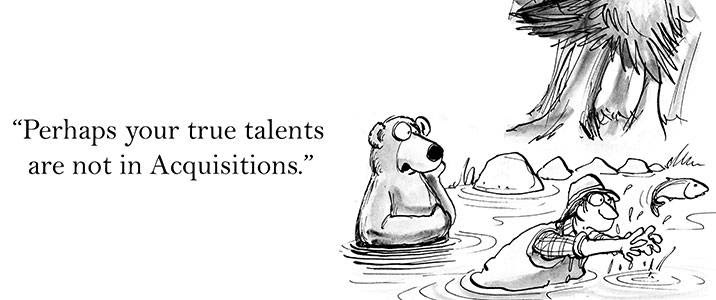I spent a good part of my career in talent acquisition, though at that time it was called just plain ‘ol recruiting. Currently, I am helping a client determine what they need in a recruiter. This got me to thinking about what skills are necessary for someone to be really great in recruiting. Here are five skills I feel are necessary for success in the talent acquisition role in your company.
Be Curious
I am a naturally curious guy. I’ve always found it fascinating to find out what people do for a living. As a recruiter, you’re going to be talking to a lot of people with diverse backgrounds and lives. To be an effective interviewer, you’ll need to be genuinely curious about who they are and what they have done. You have to want to know the details.
In an effective interview, “the devil is in the details.” Most people can give passable general answers to the questions you ask. And there are numerous websites available today to coach people on how to answer interview questions. If you as the interviewer are not curious, and you don’t probe for more details, you are likely to miss important information. So let your curiosity be your guide.
Additionally, if you come across as being bored with your candidate—and I have to admit we’ve all been there—you will not be effective in the interview process. Being genuinely curious will help stave off boredom.
Be a Conversationalist
Interviews that come across as interrogations will not go very well. You will put the candidate on the defensive, and someone who feels defensive will not be forthcoming with information. And, let’s face it—the whole purpose of an interview is gathering information. One way to prevent a defensive reaction is to treat the interview as a conversation rather than a set of questions.
A good way to get used to this approach is to imagine that you’re sitting in an airport waiting for a flight that has been delayed. You strike up a conversation with the person sitting next to you and discover she has a fascinating job you know nothing about. You want to learn more. Would you hammer the person with questions? If you did, they would probably not be very responsive and you wouldn’t learn anything. But if you ask questions in a friendly, conversational tone, the person is much more likely to be comfortable answering you.
Be a Savvy Businessperson
To be an effective recruiter, you cannot be in your own “silo.” You have to be knowledgeable not only about the business aspects of your company, but also about the broader spectrum of jobs and companies beyond your company’s four walls. This requires you to be well read and caught up on what is happening in your industry, society, and the world. You need to know specifically what is happening with your customers and your competitors. In fact, your competitors and allied industries may be your best source of candidates, and without intimate knowledge of the state of their affairs you may be missing opportunities.
If you are not aware of social trends, you may be caught off guard and miss out on the best methods for communicating with candidates. You may be unprepared and not know what to expect regarding their appearance or the experience they may have had. Business savvy is critical.
Be Able to Run with the Big Dogs
As a business-savvy recruiter, you are going to be seen as a strategic business partner. You are responsible for identifying talent that may make a major difference in the future and fortune of the company. As a result, you may be sought out by upper management for your knowledge. So you have to be comfortable dealing with high level management and not be cowed by someone’s title. With your conversational skills and business savvy, you should be able to feel at home in the C-Suite.
Be Up On Technology
No one is surprised to hear that the nature of technology has radically changed the landscape of talent acquisition. The days of running an ad in the newspaper or hanging up the “Help Wanted” sign are long gone. As my recent experience in the exhibitor hall at SHRM 14 in Orlando showed, there is no shortage of technology vendors with ways to improve your talent search. Many of these can connect you to multiple social media outlets such as LinkedIn, Twitter, Facebook, Instagram, as well as many of the large and small job boards.
In addition to being savvy about social media, you also need to be conversant in mobile technology to be able get your message across and to interact with newer generations of job seekers. If your search efforts today don’t incorporate texting, you are missing a large portion of your potential candidates.
An effective talent professional will be conversant in the multiple ways available to connect with the broad spectrum of candidates. You have to understand your talent pool and realize which method will most effectively reach the specific demographic and skill set you’re looking for.
And Have Fun with It!
Recruiting is fun and challenging at the same time. As you meet new people, you expand your network as well as your chances for enlarging your sphere of influence. It is also one of the most important jobs in any company. You affect the direction of the company as well as that of individual careers. Decisions you make today will have an impact 20 years down the road because of who you found and helped hire. Pretty heady stuff if you ask me.
The terms “recruitment” and “talent acquisition” are often used interchangeably and thought to mean the same thing — a lexicon used to describe the multitude of processes involved in the finding and hiring of candidates. Yet, recruitment and talent acquisition are not the same thing. Understanding the differences between them and adapting your hiring process accordingly can help you hire top talent better.
Let’s begin by defining the two terms.
Recruitment
A linear process that involves searching for a specific candidate to fill a specific position. Recruitment is reactive: a position is vacated or created and a new person must be found to fill it. The core function of recruiting is to find candidates for existing jobs that are currently available.
Talent Acquisition
Instead of a linear process, talent acquisition is a cyclical approach that’s geared towards building relationships, anticipating future hiring needs, and creating a sustainable pool of candidates. It’s a more strategic approach that develops and nurtures a talent pipeline with a long-term view.
Now that we have defined the terms, here are the elements that differentiate talent acquisition from recruitment.
- Planning and Strategy
Establishing a solid talent acquisition strategy needs a lot of planning. Unlike recruitment, talent acquisition requires a deeper look at the nature of your business and an understanding of future workplace needs.It’s a forward-thinking approach, looking through a wider lens, that takes into consideration the local and global labor markets. Since talent acquisition doesn’t happen in a vacuum, the process involves more planning and strategizing. - Workforce Segmentation
Talent acquisition depends on understanding the different work segments within a company, as well as the different positions within those segments.Not only do you need a thorough understanding of your company’s inner workings, you must also know the skills, experiences, and competencies that each position requires for success. - Employer Branding
More than ever before, brands are going beyond attracting consumers to attracting talent. Ensuring that your company’s brand is clear and attractive is a main element in talent acquisition.This involves fostering a positive image and company culture, and establishing a good reputation based on quality products and services. A solid brand attracts top candidates while giving them a look inside at what it’s like to work for your company. - Talent Scoping and Management
Top talent comes from many different places. Through talent acquisition, you’re researching and recognizing the different places where you can source candidates.Once you’ve established contact with potential candidates, you have to maintain and build those relationships. All of this is done with the understanding that most of these candidates will not fill positions right away but rather down the line. - Metrics and Analytics
Finally, no talent acquisition strategy is complete without using key metrics to conduct proper tracking and analysis.By collecting and analyzing pertinent information, you can continuously improve your recruiting process and make better hiring decisions, ultimately improving your quality of hire.
One thing to note is that recruitment is a part of talent acquisition. However, to only engage in recruitment is a bit like putting the cart before the horse. All of the elements listed above are necessary in order to implement a strategy that will allow companies to attract, recruit, and maintain top talent.





